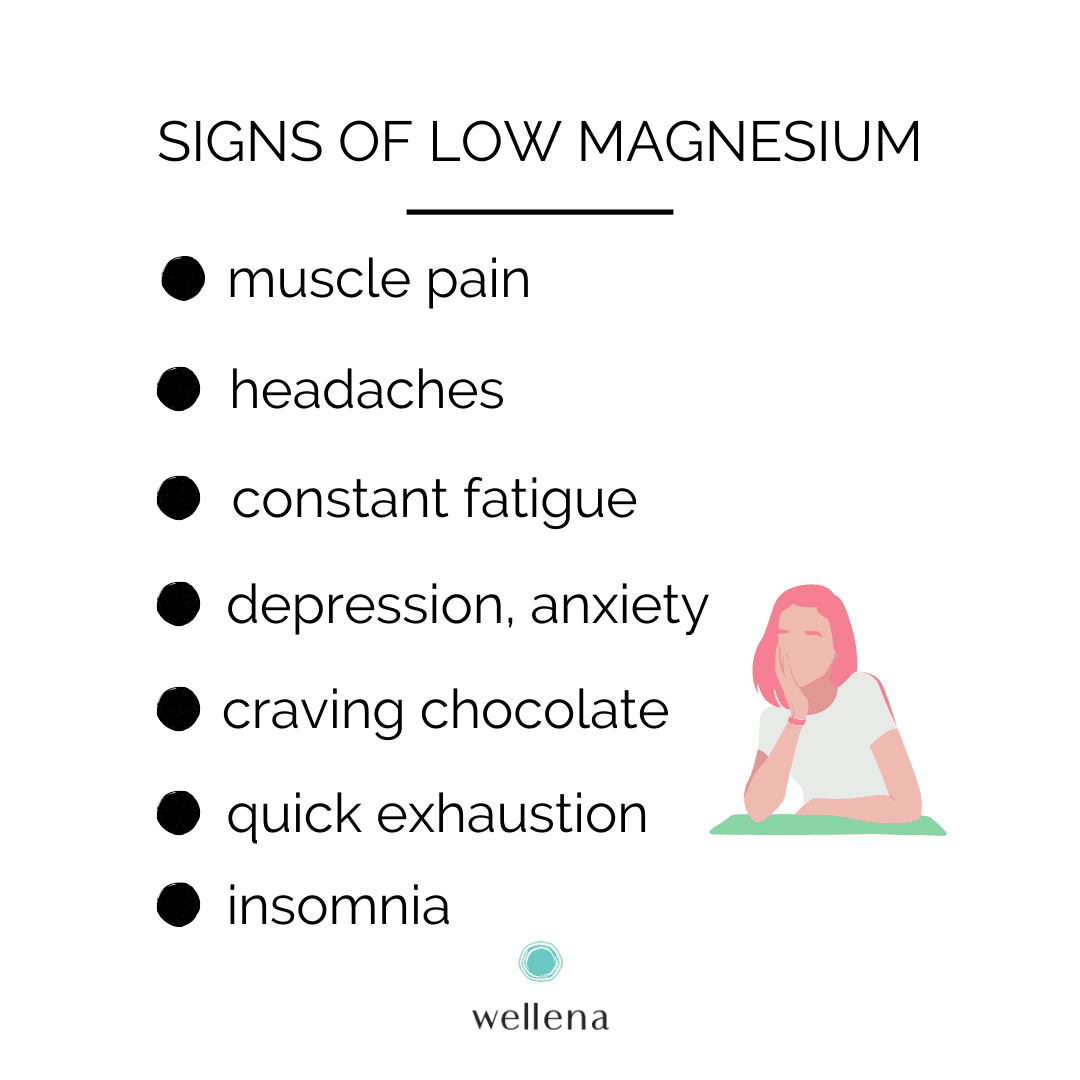What You Will Learn in This Article
- How Magnesium Impacts Hormones
- Recommended Types of Magnesium and How to Use
- Which Magnesium Supplements to Avoid
Magnesium is an essential nutrient, which means your body can’t produce it and you must get it from food or supplements. This key mineral is responsible for helping your body complete around 300 enzyme responses — many of these responses impact on your natural hormone balance. Not getting enough magnesium can lead to detoxification issues, insomnia, inflammation, fibromyalgia, osteoporosis, and heart disease. Yet, almost half of the U.S. population is depleted in magnesium.
You can replenish low levels through magnesium-rich foods like seaweed, cacao and chocolate, cashews, cruciferous vegetables, brown rice and bananas. However, sometimes, even if you are eating all the right foods, you will still need to supplement.
You may have come across various forms of magnesium – glycinate, citrate, malate, threonate, oxide, chloride.
But, before you hit that purchase button, it’s important to find the right type of magnesium for you.
Below, I will break down some of the most popular types of magnesium and their benefits. I will also talk about the types of magnesium I do not recommend and why.
Before that, here are a few more symptoms of low magnesium to look out for:
- Muscle pain, cramps, and spasms from feet cramps to chest pain (due to spasms in your heart muscle), and even restless leg syndrome
- Insomnia and mid-night waking
- Chronic constipation
- Headaches and migraines
- Feeling constantly fatigued or weak
- Depression, anxiety, and edginess
- Craving chocolate (cacao is high in magnesium)
- Quick exhaustion during exercise
How Magnesium Impacts Hormones
Let’s not forget that magnesium also plays a huge role in hormonal balance. Namely, magnesium:
- Improves thyroid function
- Helps address estrogen dominance
- Lowers blood sugar levels
- Balances adrenaline and cortisol
- Supports testosterone production
- Increases serotonin levels
- Increases the youth hormone, DHEA
For those of you wanting to do a deeper dive into this topic, you can read our article about how to boost magnesium here.
Recommended Types of Magnesium and How to Use
Magnesium comes from many different types and from many different sources. The absorption of magnesium from supplements varies as much as it does from food. Magnesium supplements are made by attaching a molecule of magnesium to a carrier of some sort: An amino acid (glycine, arginine, taurine) or an organic acid like citrate. This helps make the magnesium into a form that is recognized and absorbed by the body.
Because magnesium can be bound to so many different carriers, you end up with a wide array of options: Glycinate, malate, chloride, taurate, sulfate, arginate, lysinate, ascorbate, fumarate, gluconate, carbonate, orotate, threonate… the list continues.
I know it could be a bit overwhelming, but I’m going to cut to the chase and give you forms I especially recommend and forms to avoid.
Not all supplements are made the same and magnesium is no different. Here is a low-down to help you understand each form of magnesium.
Tip: To learn more about how to balance your hormones with supplements (and which to take), you can download our FREE Supplement Guide here.
For Depression, Anxiety, Relaxation, and Overall Wellbeing:
Magnesium Glycinate (My 1st choice)
Magnesium glycinate (magnesium chelate, magnesium bisglycinate, magnesium diglycinate) is a well-absorbed form of magnesium that is chelated to two molecules of the amino acid, glycine. Glycine is a very relaxing amino acid that can help calm anxiety and promote sleep.
This is the form of magnesium I take every day. I would double up to 600 mg, or even 800 mg per day if I’m stressed, or when I’m traveling (also a form of stress).
“Chelated” forms of a mineral mean that an amino acid has been attached to them making them a very stable form of magnesium that is less likely to cause gastrointestinal symptoms and reduces the laxative effect. This type of magnesium also helps with PMS, cramps, pain, fibrocystic breasts, cravings, and sleep.
According to Examine.com, Magnesium glycinate is also the best choice of magnesium supplement to use when “superloading” or taking more magnesium than is generally recommended in order to correct a deficiency.
The product I recommend: Magnesium Replenish.
For Energy and Pain:
Magnesium Malate
Another type of magnesium bound to malic acid. Magnesium malate is an energy-promoting form of magnesium that works by helping the body create ATP, the energy currency of our cells. This form of magnesium is often recommended to those struggling with fibromyalgia or chronic fatigue syndrome.
For those having issues with energy production, a magnesium malate supplement may be effective for helping with chronic fatigue syndrome and/or fibromyalgia. The malic acid also helps bind toxic metals like aluminum in the body. In addition to the metal detox, it also promotes liver detoxification and good digestion by improving bile flow.
No surprise, this form may be too stimulating for some and may disrupt sleep, especially when taken at night (I had this experience first hand). Therefore, take it in the morning or no later than early afternoon.
The recommended dose is 300 to 400mg per day.
The product I recommend: Mag Energy.
For cardiovascular support (including circulation)
Magnesium taurate
This form of magnesium is bound to the amino acid, taurine. Taurine reduces the stress hormone, cortisol, and increases the calming neurotransmitter, GABA. Magnesium taurate is used to increase circulation, which can have positive benefits throughout the body. For instance, in animal studies, magnesium taurate has been used to delay the onset and progression of cataracts. Try 500 mg at bedtime.
The product I recommend: Cardiovascular Research
For Memory and Preventing Cognitive Decline
Magnesium Threonate
Threonate is a form of magnesium chelated to threonic acid, a metabolite of vitamin C. This form of magnesium distinguishes itself from others in that it was created to cross the blood-brain barrier. It may, therefore, improve learning and memory functions and maybe be especially beneficial for age-related cognitive decline. The suggested dose is 2,000 mg of magnesium threonate.
The brand I recommend: Pure Encapsulations.
For Pain and Cramp Reduction (Topically)
Magnesium chloride
Magnesium chloride is a form of magnesium that can lower anxiety, reduce pain, and help promote restful sleep. Historically, it was used topically as an antiseptic. Not only is magnesium chloride a great antimicrobial treatment when given topically, it also delivers magnesium directly into the bloodstream. The skin is a great way to increase magnesium levels and bypass using the gut – this is especially beneficial for people with IBS (or leaky gut) who suffer from malabsorption of nutrients.
Additionally, if you’re not keen on the energizing aspect of magnesium malate for muscle pain (like when you’re trying to settle down for a good night’s sleep), magnesium chloride was also shown to be beneficial for fibromyalgia symptoms.
The product I recommend: Quick Magnesium.
It is a pure, 100% natural solution of magnesium chloride, coming from high-quality magnesium salt derived from the depths of the earth’s interior – all from the ancient Zechstein Seabed in Europe. Ultra-pure and untouched by pollutants, this magnesium salt was protected at depths of 5,000-6,500 feet in this seabed for the past 250 million years.
Many of our program participants have reported fantastic results using this form of magnesium; from pain reduction, feeling calmer, to deeper/longer sleep.
You can’t overdo this form of magnesium – so apply as much as you need and wherever you need it. One teaspoon will give you 600mg of magnesium and it needs 20 minutes to get absorbed. If you find it too tingling, you can either combine it with any carrier oil (such as castor or coconut oil) or wash it off after 20 minutes.
For chronic or travel constipation
Magnesium citrate
Another chelated type of magnesium bound to citric acid. This form of magnesium is about 30% bioavailable, but it pulls water into the bowels giving it more of a laxative effect, which some may like if suffering from chronic constipation. For a deeper dive into constipation, check out this article.
It’s a great form of magnesium for if you’re struggling with constipation or plan to be sitting for long periods of time, like on a long flight. Whenever I travel, I bring along a bottle of Magnesium Citrate to keep things moving.
The brand I use and recommend: Magnesium Citrate
Which Magnesium Supplements to Avoid
Magnesium Oxide
This magnesium has a bioavailability of only 4%, so it would take a lot to do any good. It can also cause negative reactions for some people – we’ve had readers report developing joint pain and GI problems. A Taiwanese study of the elderly found that those who used magnesium oxide supplements (often as a laxative or antacid) were 66% more likely to develop a hip fracture over a 5-year period.
This form is found in many magnesium supplements and should be avoided. Companies that use it tend to use other low-quality ingredients. If you see Magnesium oxide on a label, it’s a good indication that the supplement brand you’re looking at is cutting corners and isn’t putting quality and your health as a top priority. Not recommended.
Magnesium Stearate
This magnesium is used as a coating agent in supplements and isn’t water-soluble. It’s not going to help you restore your magnesium levels at all. In fact, it’s even possible to have an allergy to Magnesium stearate. This form of magnesium should be avoided. Not recommended.
Magnesium Lactate
Magnesium lactate is derived from lactic acid, which is a product of bacterial fermentation. Magnesium lactate can also be dangerous for those with kidney disease as the extra lactic acid may irritate the kidneys. Not recommended.
Magnesium Aspartate
Studies show that it does not dissolve well in water; that’s an indicator of its bioavailability, which is low. Additionally, aspartic acid is not something we want to get more of. In excess, it can be neurotoxic… like Aspartame. Not recommended.
Final Words
I hope this article was helpful in getting you on board to replenish your magnesium levels and take one step closer to rebalancing your hormones. If you want to read up more about the causes of magnesium deficiency, the dosages and which are the magnesium-rich foods – read this article.
I also invite you to read about the four forms of magnesium that have proven themselves to be the most effective at rebalancing low levels. We’ve taken those forms and developed a rotation method to capitalize on the benefits that are unique to each magnesium form throughout the day. You can read more about the Magnesium Rotation Method here.
Resources
- National Institutes of Health Office of Dietary Supplements. Magnesium: Fact Sheet for Health Professionalsweight: 400;”>. U.S. Department of Health & Human Services website. Updated online October 11, 2019.
- Hsu, Jeng M. et al. The Effect of Magnesium Depletion on Thyroid Function in Rats, The Journal of Nutrition. August, 1984.
- Volpe, Stella. Magnesium and the Athlete. Current Sports Medicine Reports. July/August, 2015.
- Sartori, S. B. et al. Magnesium deficiency induces anxiety and HPA axis dysregulation: modulation by therapeutic drug treatment. Neuropharmacology. January, 2012.
- Cinar, V. et al. Effects of magnesium supplementation on testosterone levels of athletes and sedentary subjects at rest and after exhaustion. Biological Trace Elements Research. April, 2011.
- Serefko, A. et al. Magnesium in depression. Pharmacological Reports. 2013.
- Sircus, Mark, AC, OMD, DM(P). Magnesium: the Lamp of Life – Chlorophyll, DNA, DHEA, and Cholesterol. Drsircus.com. December 8, 2009.
- Patel, Kamel et al. Magnesium. Examine.com. Updated November 15, 2019.
- Jia, Fan et al. Taurine Is a Potent Activator of Extrasynaptic GABAA Receptors in the Thalamus. Journal of Neuroscience. January, 2008.
- Wu, Y. Y. et al. Magnesium oxide and hip fracture in the elderly: a population-based retrospective cohort analysis. Osteoporosis International. January 21, 2020.







Is there a connection
Lack of magnesium and endometriosis?
What you say in the article that magnesium is an
or gets rid of detox estrogen
That sounds right
You don’t hear doctors addresses this problem
Yes, Magnesium has a significant impact on our hormones. She says in the article that Magnesium “Supports estrogen detoxification of harmful metabolites” and we need to clear those out. Endometriosis has the underlying cause of estrogen dominance.~Deanna HB Team
We’ve had people improve from all forms of good quality magnesium. Malate isn’t the only one. As mentioned in the article, I caution against malate being overstimulating for some.
Great!
Hi Audrey,
She has not shared on that form. We can ask her for the future. However, since it isn’t in this article, it must not be one that she thinks is in her top choices. ~Deanna HB Team
I have tried a lot of different magnesium pills but I have slight case if ibs and it always seems to give me gas and boosting with cramps in my stomach. I have problems staying asleep at night , hope was told magnesium should help. What do you suggest for me ?
Thanks so much!
Article says “Magnesium chloride is a form of magnesium for topical use.” I have gotten magnesium chloride flakes and soaked in the bathtub with them.
ReMag helped me overcome restless legs, insomnia and the last few symptoms of MS.
Great to hear Marcella! ~HB Team
I have hashimotos, fybromalgia
Fatigue..at times leg cramps..
Which calcium would I benefit from..
Hi Anamarie,
Do you mean magnesium or calcium? If you are asking about magnesium, Magdalena recommends this one https://hormonebalancenutritionals.com/products/magnesium-replenish ~HB Team
When is the best time of day to take magnesium. I take magnesium glycinate.
HI Kelly, thank you for your patience with our reply, you can take it in the evening before sleep. If for some reason that awakens you try taking it late morning. ~ Jen HB Support
So the glycinate was recommended for help with sleep. I took 1 pill 45 minutes before bed. I was buzzing all night! No sleep.
Thank you for your patience with our reply, try taking it earlier in the day. Late morning, and see if that works better for you Sandy. ~ Jen HB Support
What would be a good magnesium for people that have had the sleeve weight loss surgery since we have sensitive stomach .. I get cramps in my feet and calf’s , I also crave chocolate
Thank you
The article recommends the Magnesium chloride topical version for people with digestive issues.
Which magnesium do you suggest that won’t give you diarrhea.
The first one she listed said “less likely to cause gastrointestinal symptoms and reduces the laxative effect.”
I recently was diagnosed with breast cancer. And had a lumpectomy. ER+PR+HER2-
Onco Dx test came back low chance of reoccurrence at 6%
Tumor was 1.5 inches
braca rest came back negative for gene mutation and no cancer spread to lymphnoids. I will need 4 weeks of radiation and most likely will be taking medicine for 5 years.
What supplements do you recommend?
Hi Lisa, I recommend to look up Dr V from Breast Cancer Conqueror and applying her protocol.
Should magnesium be taken with another supplement for better absorption? Like calcium or vitamin d3?
Hi Susan, no, it does not 🙂
Just wanted to add that too much calcium is actually bad for your magnesium levels. Hypercalcemia is a very real threat.
https://www.mayoclinic.org/diseases-conditions/hypercalcemia/symptoms-causes/syc-20355523
On CA and MG relationship:
https://www.healthline.com/health/food-nutrition/magnesium-overdose-whats-the-likelihood (CA given to reverse MG overdose)
https://www.ncbi.nlm.nih.gov/pubmed/2673775 (Hypercalcemia involves potassium and MG IVs)
There’s also Vitamin D and its relationship… It’s very complicated stuff and there is so much being learned every year on just how important vitamins really are to health. That being said, MG is one of those things that most western diets are deficient in while CA and vitamin D aren’t with plenty of sunlight and dairy.
Best bet, monitor your diet and compare to recommended daily requirement. Supplement the deficiency only! Get a blood test if unsure.
Be safe! Knowledge is power.
Which magnesium is best for menapause imbalance/ flashes and migraine. Not sure HRT is working for me, not feeling myself very up and down Any advice would be appreciated.
Hello, What Magnesium will I take for Diabetes? [email protected]
Hi Daba,
Along with a supportive way of eating, a recommended magnesium would be this one https://hormonebalancenutritionals.com/products/magnesium-replenish ~HB Team
Hello,
I’m having terrible jot flashes. Which kind of magnesium & how much should I take? My gyne recommended the oxide. Why would she do that? Thank you for any help you can give me.
Christina S.
It seems this question has been asked several times, but no answer has been provided. I would be interested in a response.
Hi Marisa,
What is the question you have? ~HB Team
Is it possible to overdose on Magnesium?
Hi Mindy, yes, magnesium citrate pulls water into the bowels giving it more of a laxative effect. It’s best to start low and slow to see how your body responds. ~ Jeanne HB Team
Hi Karen, Magdalena did cover citrate in the article: “Magnesium citrate is another chelated type of magnesium bound to citric acid. This form of magnesium is about 30% bioavailable, but it pulls water into the bowels giving it more of a laxative effect, which some may like if suffering from chronic constipation.” ~ Jeanne HB Team
Can my husband take Magnesium Replenish as well or is this formulated for women?
Hi Crystal, Yes, men can take Magnesium Replenish as well as women. ~ Jeanne HB Team
been using OTC magnesium/800mg daily(2am-2pm) just ordered replenish mag. So excited to see if I feel better with less dosage! Stay tuned 🙂
Hi Michele,
Very good. Yes, if you have any questions, please contact the team at [email protected] 🙂 ~HB team
I have digestive issues ( constipation) and sleep issues with fatigue. Which should I use, how much and what time of day?
Hi Kari, either magnesium bisglycinate or citrate would both help with constipation and sleep issues. The dosage is on the label, many people take it before bed to help with sleep. ~ Jeanne HB Team
I have hypothyroidism about 24 years ago, I am 44 years old. I used to use magnesium and after 7 years using it I started myself, reading. After this time I just realized about different sorts of magnesium. I am looking to starting using the magnesium bisglycinate, 1 choice recommendation. Is there any problem introducing this magnesium with my thyroid problem?
Hi Nivea, many people with thyroid problems are deficient in magnesium, thus it would be helpful. If you have any concerns regarding taking supplements with a medication, it would be best to discuss those concerns with your functional medical practitioner as he or she would be most familiar with your health history. ~ Jeanne HB Team
what different magnesium can you take in one day please
Which variety would you like to try Bridget? ~HB Team
Hello Magdalena! What about magnesium taurate, whats your opinion about this form?/ Annika from sweden
Hi Annika, there are many different forms of magnesium sold on the market, Magdalena was not able to research all of them. If you are taking a different form of magnesium that was not discussed in the article, we suggest you tune into your body to see how it is working for you. How does it make you feel?
~ Jeanne HB Team
Magdalena, thank you so very much for writing this article. I have had fibromyalgia and sleep issues (despite good “sleep hygiene” practices) ever since cancer treatment in 2006. Magnesium malate was recommended to me for the fibromyalgia and I mistakenly thought that all magnesium was “relaxing,” so I have been taking magnesium malate in split doses — including at dinner and right before bed. After reading your article, I started taking magnesium malate in the morning and afternoon (for fibro), and magnesium glycinate with dinner and before bed (for sleep). Although I still have trouble sleeping some nights, I am sleeping better than I have in years. I have especially noticed improvements in my memory. Thank you, thank you, thank you! You have made a big difference in my quality of life and I am very grateful.
I am so happy to hear that you have seen improvements in your sleep and memory! Keep up the good work! =) -Taylor, HB team
Which Magnesium is good for Diabetes?
Hi Joyce,
Any of the above forms would be good options. You may also be interested in exploring the following items with your medical professional.
https://wellena.com/collections/frontpage/products/sugar-balance-kit
Healthy Regards,
HB Team
Concerning magnesium oxide.
Ive learned that people are different biochemically. What works for you may not work for me. We can consider all of these recommendations but we may want to carefully try for ourselves. Magnesium oxide has worked WONDERS for me. I am sure that an over abundance of ANY of these forms will loosed the bowels. However, just because you dont recommend it doesnt mean it wont work perfectly for someone else.
I agree that it is best to try something out for yourself and see how you feel. For more individualized recommendations for a supplement routine, it is best to speak with your medical professional. However, I am happy to hear that you have found what works best for you! -Taylor, HB team
Just wondering what you think about drinking magnesium chloride dissolved in water.
Yesterday, my friend recommended me to do it before bed when she heard me saying waking up at night. She gave me a little bit to try from her bottle and it worked. I slept thru the night without waking up.
So, I googled it today to see what’s out there. And, a lot of it says it’s topical and let the skin absorb, instead of taking orally…. but, it worked for me last night, the first time I tried.
Would it be bad if I take it for longer term??
Thank you!
HI Grace, Thank you for sharing with us here. There are many different forms of magnesium sold on the market that Magdalena couldn’t cover in the article. We suggest you tune into your body to see how it is working for you. I’m happy to hear the magnesium chloride helped you sleep. That’s wonderful! ~ Jeanne HB Team
[…] 15.4K […]
[…] Which Form of Magnesium is Right for You? by Magdalena Wszelaki on February 3, 2020 at 7:09 pm […]
[…] … and the list goes on. If you’d like to learn more about these different types and what they can do for you, see my article, “Which Form of Magnesium is Right for You?” […]
I am have all the systems described. Wake up
I hotter than a fire in the middle of the night and have hot flashes during the morning and then 6:00 I am cold for several hours then hot again on an off in the night.
[…] If you want to read up more about which forms of magnesium may be right for you, I recommend reading this article. […]
Magdalena, You suggest Magnesium Replenish, but that contains Magnesium OXIDE! I’m surprised you’ve suggested that supplement.
I’d prefer taking Magnesium Chloride for my leg cramps and difficulty sleeping, but I can’t seem to find a trusted brand in supplement form. Do you have any recommendations? Thanks.
Thank you for diligently checking the labels!
Here is a fuller context: When we worked on formulating Magnesium Replenish, the formulators (who are also scientists and researchers), suggested using a tiny amount of magnesium oxide in the magnesium glycinate formulation (which is Magnesium Replenish). Why? Because research shows that magnesium gets absorbed better when there is a tiny amount of mag oxide. The problematic (and potentially harmful) magnesium oxide we covered in the article is an issue when it’s the only form found in the supplement. I hope this clarifies this issue and thank you again for your diligence!
If you are interested in magnesium chloride, we actually carry a topical one called Quick Magnesium.
Healthy Regards,
HB Team
Which is the best magnesium for bones?
Thanks for the great info – I don’t have any of the issues directly address in this article – Armpit BO & fibroids are my concern – Citrate has been recommended to help decalcify broids – Milk of Magnesia has been recommended for ArmPit Funk – The Magnesium in MOM is not listed – Does it fall into the OXIDE category? – Can Citrate be substituted for MOM as a Deo for my BO without causing skin reactions as with most “natural” Deos (as I’ve completely elimin8ed standard Deo)?- Thanks
Hi there!
Magnesium citrate is a wonderful supplement. I am not aware of MOM effect on armpit BO, however, I do know that it sometimes takes time once you have stopped using standard DO’s for your body to adjust. Diet also can play a major role.
If you are interested in learning how to make your own DO, along with many other all-natural household products, feel free to check out our Herbs for Balance program.
Healthy regards,
HB team
What a great well written article. Thanks!
Hi, I am experiencing insomnia due to menopause and came across information that one reason it happens is because lower estrogen means less transporting of magnesium in tissues. This led me to you.
I also heard at a Menopause Summit that you need to take a higher dose of Magnesium Glycinate because it’s most likely that the supplement is heavy on Glycinate and not magnesium. Would you please comment on this and help us understand if your Magnesium addresses this?
– Sleepless in NYC 🙂
[…] Try supplementing with Vitamin B6, magnesium, and possibly potassium. No matter what, make sure you’re eating plenty of potassium-rich […]
Thank you for this article. I found it the most comprehensive and helpful out of all the ones I read. I appreciate the time that went into creating concise and thorough information.
I drink poo water
What about Magnesium Gluconate (Magulate)?
Hi Mary, There are so many different types of magnesium, and we chose the versions that are the most absorbable in the body. For this reason, we chose not to review Magnesium Phosphate for this article. – HB Team
Amazing post buddy, you really made a good contribution here 🙂
magnesium hydroxide ?
I am 56. When I take magnesium my hot flashes get much much worse. I cannot take the Glycinate type because it causes me to get cold sores. Is there a Magnesium type that does NOT remove estrogen from my body besides glycinate?
Best form of magnesium is found in human poo. I eat my own poo which saves me buy magnesium
I take celexa for anxiety and depression. I have type 2 diabetes and high blood pressure. What type of magnesium should I take
I didn’t see any mention of Magnesium Carbonate.
I have been taking Kid Calm and my kids take the regular one form Natural Vitality
Recommended by any of the health providers I have or am seeing now.
the regular one has Magnesium Carbonate only while the Kids calm has carbonate and glycinate forms along with some other vitamins/minerals
what are your thoughts on this form of Magnesium?
Hi there! I have had Fibromyalgia/CFS FOR OVER 20 years, plus a history of severe anxiety, agoraphobia, and poor sleep. I’m trying to decide which type of magnesium would be best for me to try. So it looks like my two best options are Glycinate and Malate. What concerned me about Malate is where it said it could cause over-stimulation. What, exactly, does that mean? How does the over-stimulation manifest in the body/brain? Would I possibly have heart palpitations? Are both types helpful with anxiety, or only Glycinate? Thanks for your help!
Hi Noah, thank you for sharing your story with us. The over-stimulation comes from the ability of Malate to increase cellular energy production which can make some sensitive people awake and energized. Both forms are good for overall relaxation. Malate has been studied more in relation to relaxing overactive nerves although glycinate is a close second. ~HB Team
What do you think of reacted magnesium by ortho molecular products?
Hi Margie, unfortunately we can cannot speak to their facility manufacturing processes and how they compound their magnesium as we do not know that information. Although, I’m sure if you reach out to them they could give you great information on quality, potency and some insight into their manufacturing process. ~HB Team
Thank you for such an informative article. I’ve also heard that Magnesium helps in decalcification. What form of Magnesium helps I’m achieving that?
Yes, magnesium has been shown in some studies to help decalcify arteries. It’s the magnesium itself that is involved in this job so making sure to use a highly absorbable form such as magnesium glycinate or magnesium malate would be some of your best options. ~HB Support
Currently taking Magnesium orotate for better absorption, but you do not mention that here.
I take the orotate form for calcium, in order to prevent calcium build up, so presumed orotate for for magnesium would be best, but…?
Hi Sally, there are so many forms of magnesium, not all are mentioned here. However magnesium orotate is also a wonderful form of magnesium although, it typically is the most expensive form as well. ~HB Support
Recently diagnosed with PMDD what form of magnesium would be best?
Hi Michelle, we recommend magnesium glycinate or magnesium malate as these can be the easiest forms to digest and absorb. ~HB Support
Hello… I am doing HRT at this moment … what would be the best magnesium to pair with this
[…] Read more about different forms of magnesium and their effect here. […]
[…] are many types of magnesium supplements. Magnesium supplements are magnesium compounds. The complementary component of magnesium in the […]